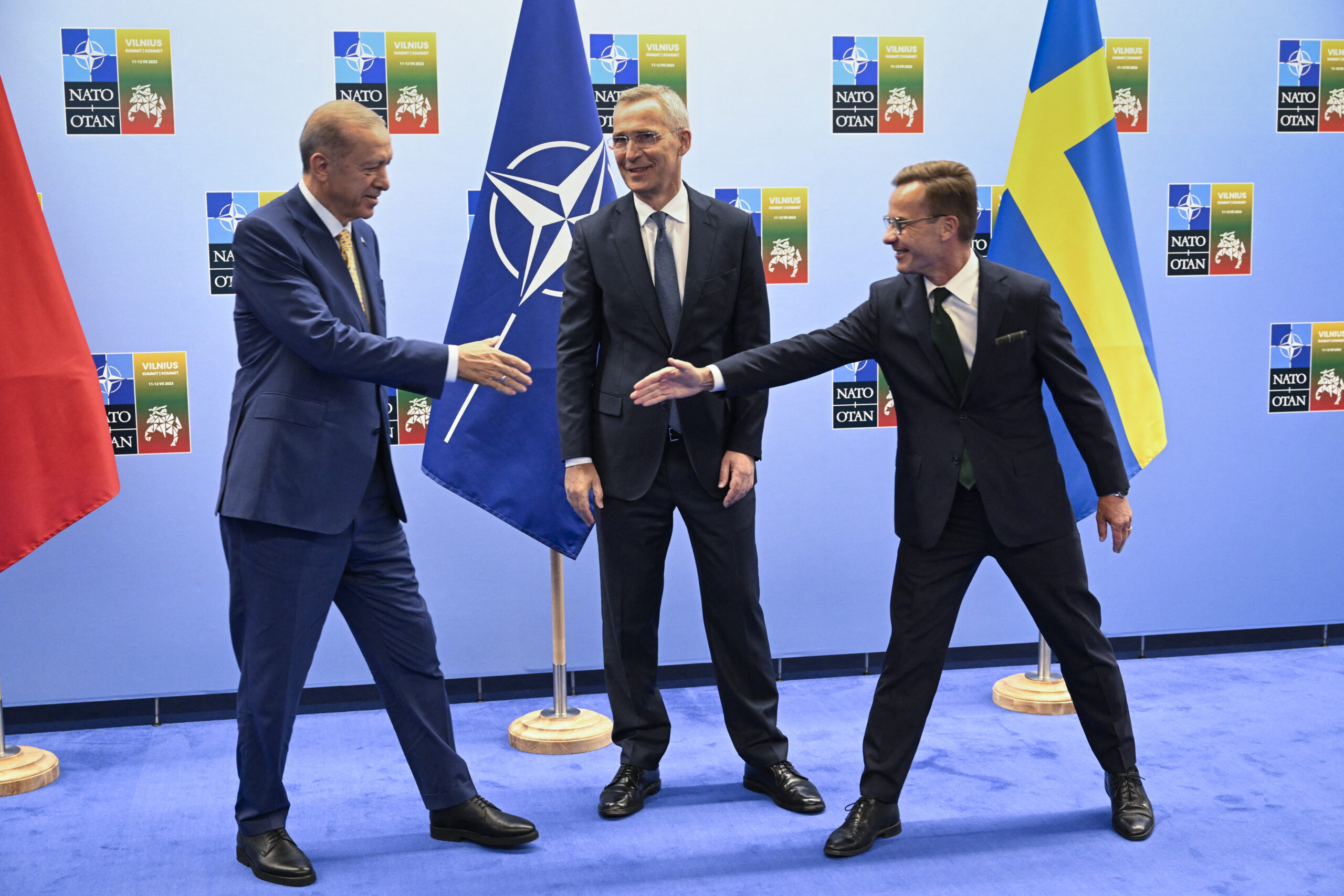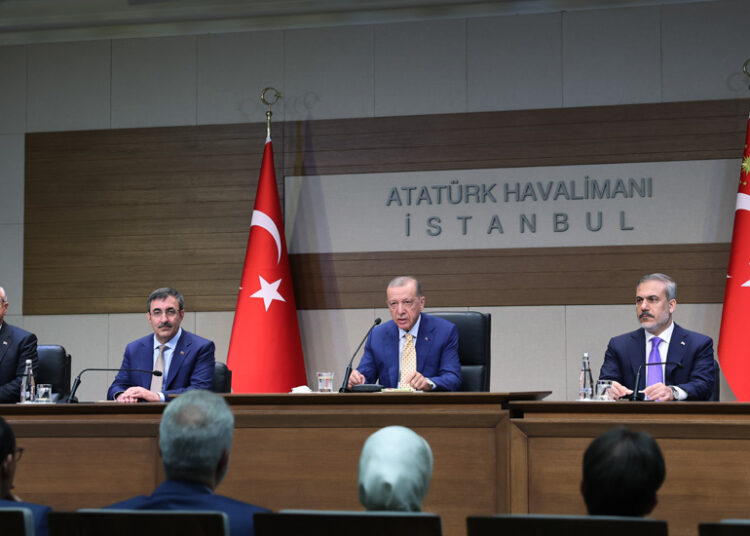Levent Kenez/Stockholm
Turkish President Recep Tayyip Erdogan, speaking at a press conference on Monday before departing for the July 11-12 NATO summit in Vilnius, expressed his displeasure over restrictions and sanctions imposed on Turkey’s arms purchases, claiming that NATO allies’ military embargoes are preventing Turkey from reaching the alliance’s defense spending target.
Since 2006 NATO member nations agreed to commit a minimum of 2 percent of their gross domestic product (GDP) to defense spending.
“Another important outcome of the summit will be the renewal of the commitment to a minimum of 2 percent in defense spending. While there are discussions about increasing defense expenditures on the one hand, we also see restrictions being imposed on the other. Unjust restrictions and obstacles imposed by some of our allies are limiting us. Our country, which reached almost 2 percent defense spending in 2019, has currently declined to around 1.30 percent,” Erdogan told reporters.

During his re-election campaign in May, Erdogan repeatedly claimed that Turkey’s reliance on foreign sources has decreased as a result of its development of its defense industry. However, Turkey’s decreasing defense industry expenditures are not solely attributed to the restrictions imposed by Western countries. In May Muhsin Dere, Turkey’s former deputy minister of defense, admitted that the government cannot fully meet the needs of the military in terms of supplying it with new equipment and weapons due to the poor state of the Turkish economy, during a meeting of a pro-government business platform run by Erdogan family members that brings together industrialists from around İstanbul.
Dere said Turkey’s defense spending had decreased in recent years, adding that the reason is not a decrease in need but rather a decrease in purchases.
Dere said Turkey would soon have to supply the military with a large amount of equipment and weapons.
“God willing, Turkey’s economic situation will be much better, and we will meet the needs of the army from A to Z,” he added.
Turkey’s military expenditures amounted to $10.6 billion last year, a decrease of 26 percent compared to 2021. Turkey ranked 23rd among countries with the highest military spending last year.
The most significant challenge Turkey faces in terms of procurement is the purchase from the United States of new F-16 fighter jets and modernization kits to upgrade its outdated fleet. In addition, some NATO members, particularly Canada, Germany and France, have imposed unofficial arms embargoes on Turkey following its unilateral military operations in Syria in recent years.
In 2021 the US administration officially excluded Turkey from the F-35 Joint Strike Fighter program due to Ankara’s purchase of a Russian S-400 missile system in 2017.
In February US senators from both the Democratic and Republican parties sent a letter to US President Joe Biden urging him to postpone a $20 billion F-16 sale to Turkey until Sweden and Finland’s NATO accession is approved. Finland became NATO’s newest member on April 4.
Nevertheless, the White House does not want to further isolate Ankara from the Western alliance or push it towards alternative markets like France, the UK or Russia since Turkey has not activated the S-400 missile system. If Turkey fails to acquire F-16s after being removed from the F-35 project, it would be a significant setback.
So much so that Erdogan on Monday said Biden told him he was mobilizing all possible resources to overcome the Senate opposition to the F16 sale during a telephone conversation on Sunday.
“We will discuss these issues with President Biden, and I hope we can overcome this difficulty. It also saddens us that this issue has been associated with Sweden. This is something different. I hope the outcome will be positive,” Erdogan added.
Some observers predict that Erdogan will abandon his opposition to Sweden’s membership in NATO during the summit in Vilnius, potentially paving the way for parliamentary approval in the coming months. Ankara is currently facing an economic crisis, with the Turkish lira hitting a record low against the US dollar. The government aims to avoid exacerbating the situation by engaging in a new crisis with the US as it could further deteriorate the economy.
It is no secret that Turkey faces difficulties in sourcing the materials needed for its ambitious defense industry projects. Nordic Monitor previously reported that in an interview with a Turkish TV station on September 4, 2022 İsmail Demir, the former head of the Presidency of the Defense Industry (Savunma Sanayii Baskanligi, SSB) admitted that the agency faced challenges in developing power packs including engines and transmissions for various defense projects.
It’s not only the parts but also a shortage of qualified engineers that is hindering progress, he said.
“The engine issue is a known [problem]. As for trained personnel and expertise, we also don’t have extensive experience. There are a limited number of experts [in Turkey],” said Demir, who was sanctioned by the US over Turkey’s purchase of the Russian S-400 long-range missile system.
Turkey has several national aircraft and tank projects, but they suffered a setback because of the difficulty in finding engines and transmission systems to power the equipment. The Erdogan government has invested heavily in manufacturing engines domestically, with limited success thus far in the testing and integration stages.
Meanwhile, only seven of NATO’s 30 allied countries met the military spending target set by the North Atlantic Alliance in 2022, the military organization’s secretary general, Jens Stoltenberg, confirmed in March. The US, Estonia, Greece, Latvia, Lithuania, Poland and the United Kingdom all achieved the standard, with Croatia and France among those falling just short. Others were further behind.
According to data from the International Peace Research Institute (SIPRI), headquartered in Stockholm, global military expenditures have slowed in 2023 due to inflation, despite reaching a record level in 2022.
Global military spending increased by 3.7 percent in 2022, impacted by Russia’s war in Ukraine, to an all-time high of $2.24 trillion.












